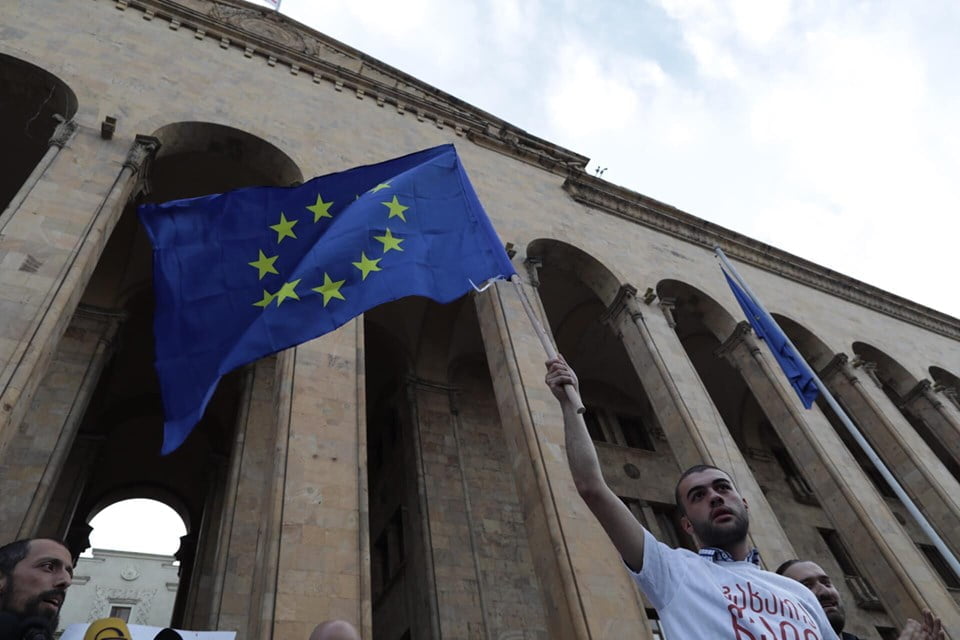On May 13, Member of European Parliament Andrius Kubilius, the Chair of the European Parliament’s Delegation to the EuroNest Parliamentary Assembly released a statement, in which he spoke of the conditionality of the European Union’s assistance to Georgia, calling on Georgian political parties to fulfill commitments undertaken through March 8 Agreement on electoral reform.
Highlighting “a huge support amounting to more than 500 million euros” the EU and its international partners are giving on the ground to assist Georgia implement reforms, tackle Coronavirus pandemic and address its social and economic consequences, MEP Kubilius stated that “a key component of this support is bonded with commitments taken by Georgia, especially in the area of rule of law, fight against corruption, electoral reform, economic governance and transparency.”
“We are here to help Georgia to have the highest standards of judicial system and a transparent electoral process, and we will do all what is necessary to help Georgia and its people to enjoy to the maximum the benefits of open democracy, protection of human rights, economic growth and prosperity,” Kubilius stated.
- IMF Allocates USD 200 Mln to Help Georgia Mitigate COVID-19 Fallout
- European Commission Proposes EUR 150 Mln to Georgia
- EU Allocates EUR 183 Mln to Support Georgia’s Needs amid Pandemic
Noting that “the EU has been standing behind Georgia” since the beginning of Coronavirus pandemic, MEP Kubilius stated that “part of budget support disbursements” proposed by the European Union for Georgia “will be tied to specific conditions for Georgia, in particular to implementation of ongoing reforms in areas of rule of law, judicial and electoral reform.”
Speaking of forthcoming challenges in managing COVID-19 crisis, which will bring negative social and economic consequences for Eastern Partnership nations, including Georgia, Kubilius stated that “it will be the EU responsibility to continue supporting Georgia and the other Eastern Partnership countries having chosen the path of European integration reforms.”
“We should be looking into a longer-term support by the EU for economic recovery and reforms, and establish a detailed economic and investment plan for Georgia, in the same manner as it is proposed for the Western Balkans region,” noted MEP Kubilius.
Hoping that Georgia “will be ready to become” the European Union member, Kubilius said “as the EU associated country, Georgia I believe understands this responsibility.”
We have to work all together in an atmosphere of trust to protect democracy and achieve this objective. That trust can only build by making progress on fulfilment of commitments and promises made, including the ones reached on 8 March 2020 among all the main political parties in Georgia,” he stated.
- Opposition Vows not to Back Constitutional Amendments “unless Political Prisoners Are Released”
- Georgian Dream Denies Having Pledged to Release “Political Prisoners”
- MEP Kubilius Writes Georgian President, PM over March 8 Deal, Speaker Talakvadze Responds
Earlier, on May 6, Kubilius sent a letter addressed to Georgian President Salome Zurabishvili and Georgian Prime Minister Giorgi Gakharia, reminding Georgian leaders that “European partners need a clear confirmation that progress is being made to ensure the necessary conditions for free and fair parliamentary elections in 2020.”
Kubilius then stated that “to date, unfortunately, the cases of Gigi Ugulava, Irakli Okruashvili and Giorgi Rurua have not been properly addressed, putting into question the 8 March Agreement.”
In a letter responding to MEP Kubilius, Georgian Speaker Archil Talakvadze highlighted that he “was concerned by the part of [Kubilius’s] letter referring to particular criminal cases.” Talakvadze said “Georgian courts cannot be ordered or directed by the political parties.”
The ruling Georgian Dream and the opposition parties continue sparring whether the March 8 Agreement included a precondition to “release political prisoners.” Georgian Dream says that they have not pledged to “release political prisoners” in any form, while the opposition states the “release of political prisoners” was one of the prerequisites of the deal.
This post is also available in: ქართული (Georgian) Русский (Russian)

